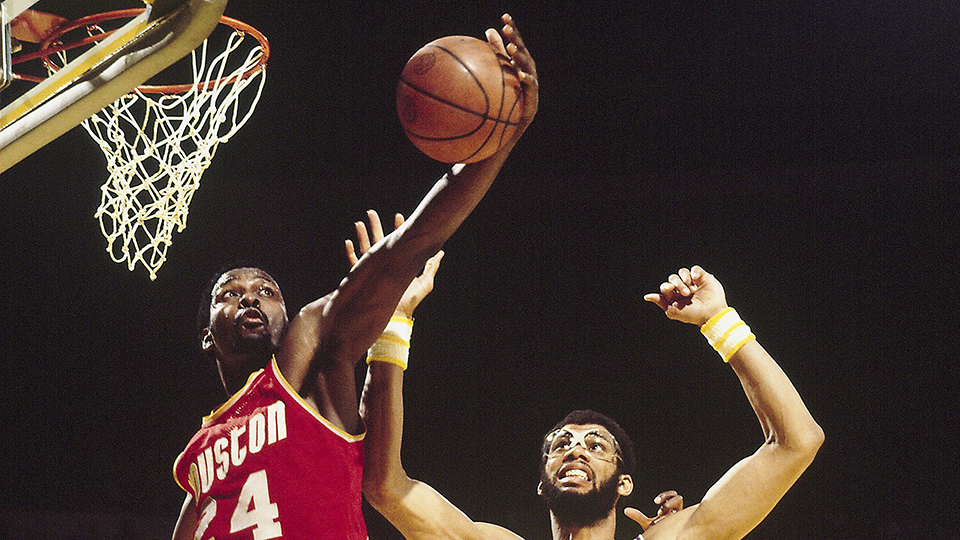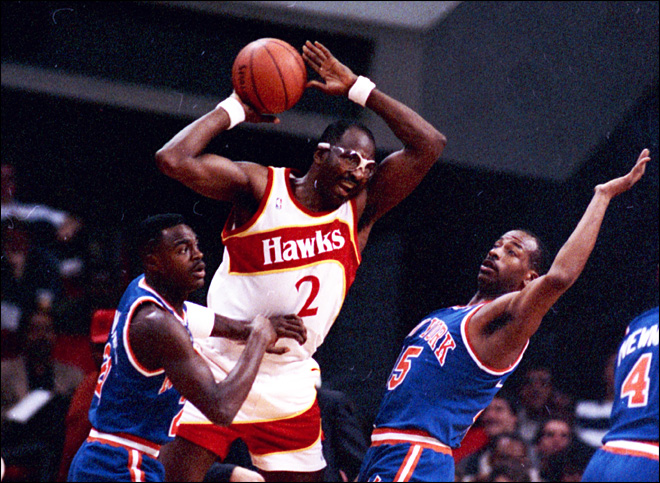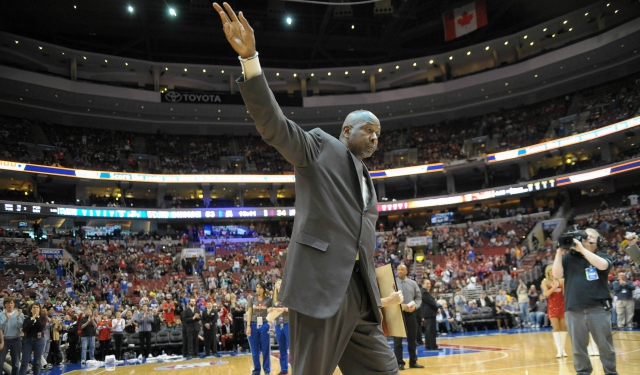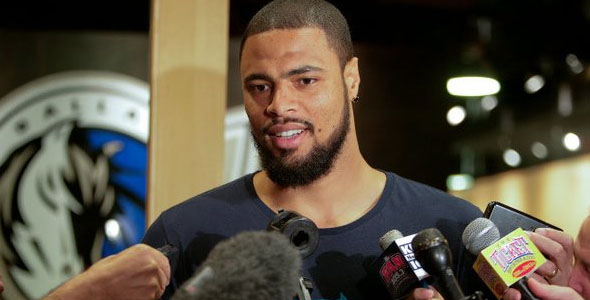NBA legend and trailblazer of the game, Moses Malone passed away early Sunday morning at the age of 60.
It is truly a sad day for basketball fans and historians around the world as the basketball world lost one of the best players to ever grace the hardwood regardless of era.
“The Chairman of the Boards” as he was referred to (a truly fitting and creative nickname which is rare in this day and age) played an incredible 22 seasons of professional basketball including two in the ABA and 20 in the NBA.
Moses Malone was the first player to go directly from high school basketball to professional basketball as he was drafted by the Utah Stars of the ABA in 1974 at the age of 18 and averaged an impressive 18 points and 14 rebounds per game in his rookie season.
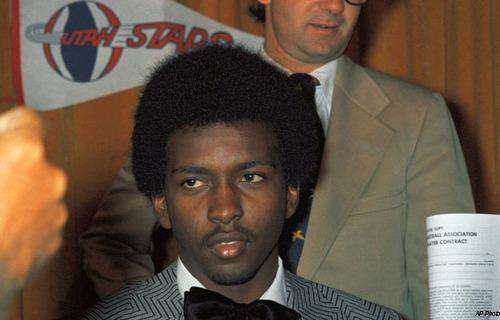
Moses Malone was drafted right out of high school by the Utah Stars of the American Basketball Association in 1974.
Although Malone wasn’t actually the first person to be drafted by a professional team straight out of high school, that honor goes to Reggie Harding who was drafted in the fourth round of the 1962 NBA Draft by the Detroit Pistons in 1962, he was the first to play in a professional basketball directly out of high school. He was the first beneficiary of the 1971 Supreme Court decision of Haywood v. National Basketball Association, in which the Supreme Court ruled players could enter the NBA Draft without having to be four years out of high school if they could provide evidence of financial hardship to the NBA office.
Malone would play two seasons in the ABA for the Utah Stars and the Spirits of St. Louis and average 17 and 13 before the ABA-NBA merger in 1976. After a few NBA franchises played hot potato with his rights, (the Jazz initially selected Malone in a pre-merger draft for undergraduate players in December 1975 but traded his rights to get their 1977 first round pick back, leading Malone to be drafted by the Portland Trailblazers in the merger who promptly traded him to the Buffalo Braves who traded him to the Houston Rockets two games into the 1976-77 season) Malone would find a home in Houston where he began to leave his everlasting mark on the league.
After two successful seasons in Houston and one all-star appearance, Malone would make the leap to mega star in his third season in 1978-79 averaging 24.8 points and 17.8 rebounds en route to being named as the league’s most valuable player at the age of 24.
He would play three more seasons in Houston, leading the Rockets to the NBA Finals in 1981 before losing to Larry Bird and the Boston Celtics in six games (Malone would average 26.5 points and 14.8 rebounds in that postseason), and earning his second MVP award at the end of what would be his final season in Houston in 1982, His best as a pro. Malone averaged 31.1 points per game (2nd highest in the league) and led the NBA with 14.7 rebounds per game.
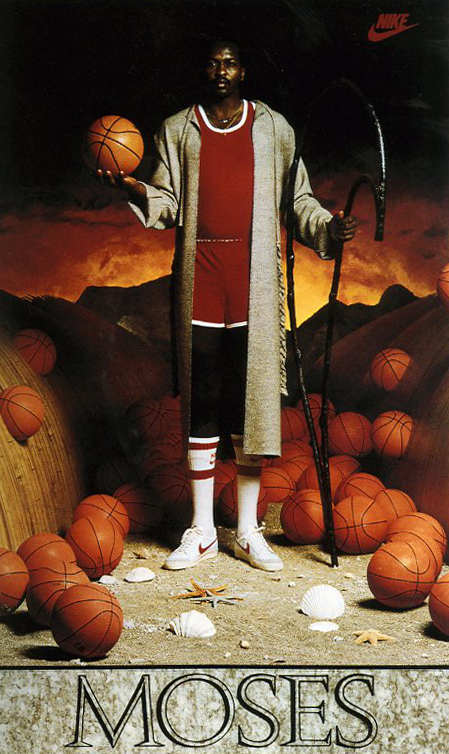
This is an iconic poster Nike released in the early 80s after Malone’s 2nd MVP award referencing his biblical namesake.
The 76ers lost to the Los Angeles Lakers in six games in the 1982 NBA Finals and the addition of Moses Malone would be just what they needed to put them over the top.
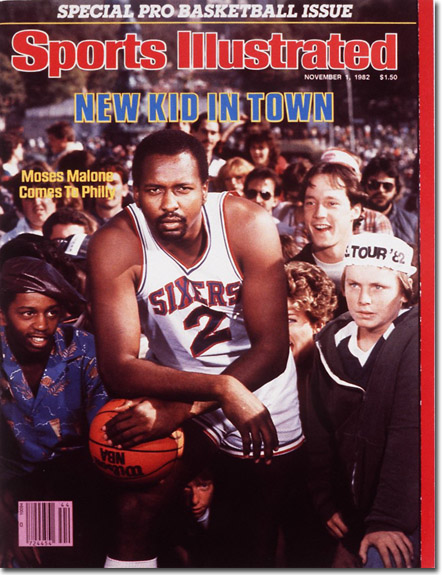
Malone was traded to the 76ers after his second MVP season in 1982 and would lead the Sixers to the NBA title in 1983.
Malone would win his third and final league MVP award after the 1983 season, averaging 24.5 points and 15.3 rebounds and leading one of the most dominant teams in NBA history to a 67-15 regular season record and 12-1 postseason record and an NBA title.
Moses also provided one of the more memorable quotes in NBA history that postseason as shortly before game 1 of the playoffs in 1983 a reporter would ask Malone how he thought the 76ers would fare in the postseason and Moses famously responded “Fo, fo, fo” predicting the 76ers would sweep their way through three playoff series en route to the NBA championship.
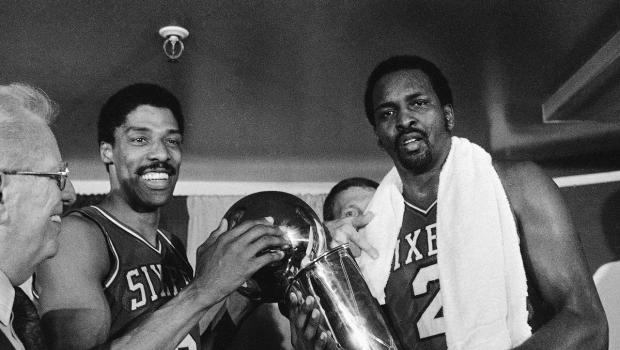
Moses Malone was named NBA Finals MVP after the 76ers swept the Lakers in the 1983 NBA Finals. He averaged 25 points and 18 rebounds in the series.
Malone would play three more seasons in Philadelphia, making another All-NBA First Team appearance, an All-NBA Second Team appearance and averaging 24 and 13.
He was traded to the Washington Bullets before the 1986-87 season. He would play two seasons in Washington, making one All-NBA Second Team appearance and averaging 23-12.
After leaving the Bullets in free agency in 1988, Malone would make two more all-star appearances in 1988 and 1989 and average 15 and 9 in five seasons with Atlanta and Milwaukee before playing a limited reserve role in Philadelphia and San Antonio.
Malone would retire from the NBA after the 1994-95 season at the age of 40 and after an incredible 22 year professional basketball career. He was named as one of the 50 greatest players in NBA history in 1996 and was inducted into the Basketball Hall of Fame in 2001.
As it stands, Moses Malone is still 3rd in NBA history for total rebounds as the “Chairman of the Boards” pulled down 17, 834 rebounds in his career an average of 12.4 per game. He is eight on the all-time scoring list with over 27,000 points and 20.3 point per game. Malone is one of only 8 players in NBA history to win the regular season MVP award three times and was awarded the NBA Finals MVP award in 1983 after winning his only championship with the 76ers.
Malone averaged a double-double 14 straight seasons in the NBA and led the league in rebounding six times, including five years straight from 1980 to 1985. When you consider his longevity, durability, consistency, team and individual success and accolades, he could easily be regarded as one of the 10 best players in NBA history.
He was overshadowed by the greatness of other stars from his era such as Kareem Addul-Jabbar, Magic Johnson and Larry Bird, but he may have been the best center in the NBA in the 1980s and deserves to be mentioned in the discussion of the greatest centers of all time, along with Kareem, Wilt, Russell, Shaq and Hakeem.
Moses is a fitting name for this all-time NBA great as he would part the red sea or clear out the paint and establish his territory underneath the rim with his physicality and intense desire to dominate the glass. He would also lead those who followed him to the NBA promised land, much like his namesake.
The stat that perfectly encapsulates Moses Malone’s hall of fame career is that he has the most offensive rebounds in NBA history with 7,382, which is the perfect hustle stat and is indicative of the player he was.
Malone summed up his thoughts about his offensive rebound prowess with this humorous quote:
“I never thought I would lead the NBA in rebounding but I got a lot of help from my teammates, Malone said. “They did a lot of missing.”
Moses was once asked by a reporters what he would have done if he had not played professional basketball:
“Hard to say. The Lord made some people to be engineers; he made some people to be doctors. He made me to be a great basketball player.”


